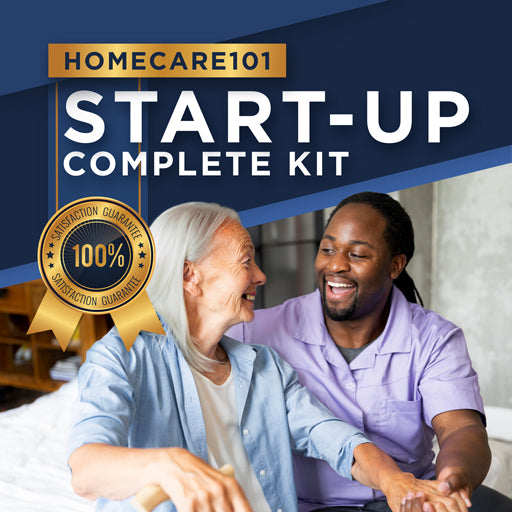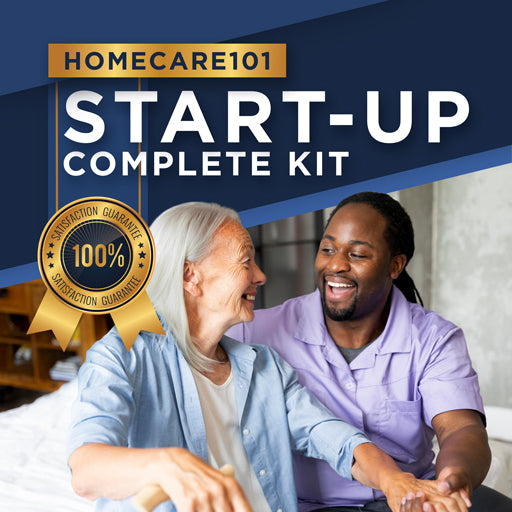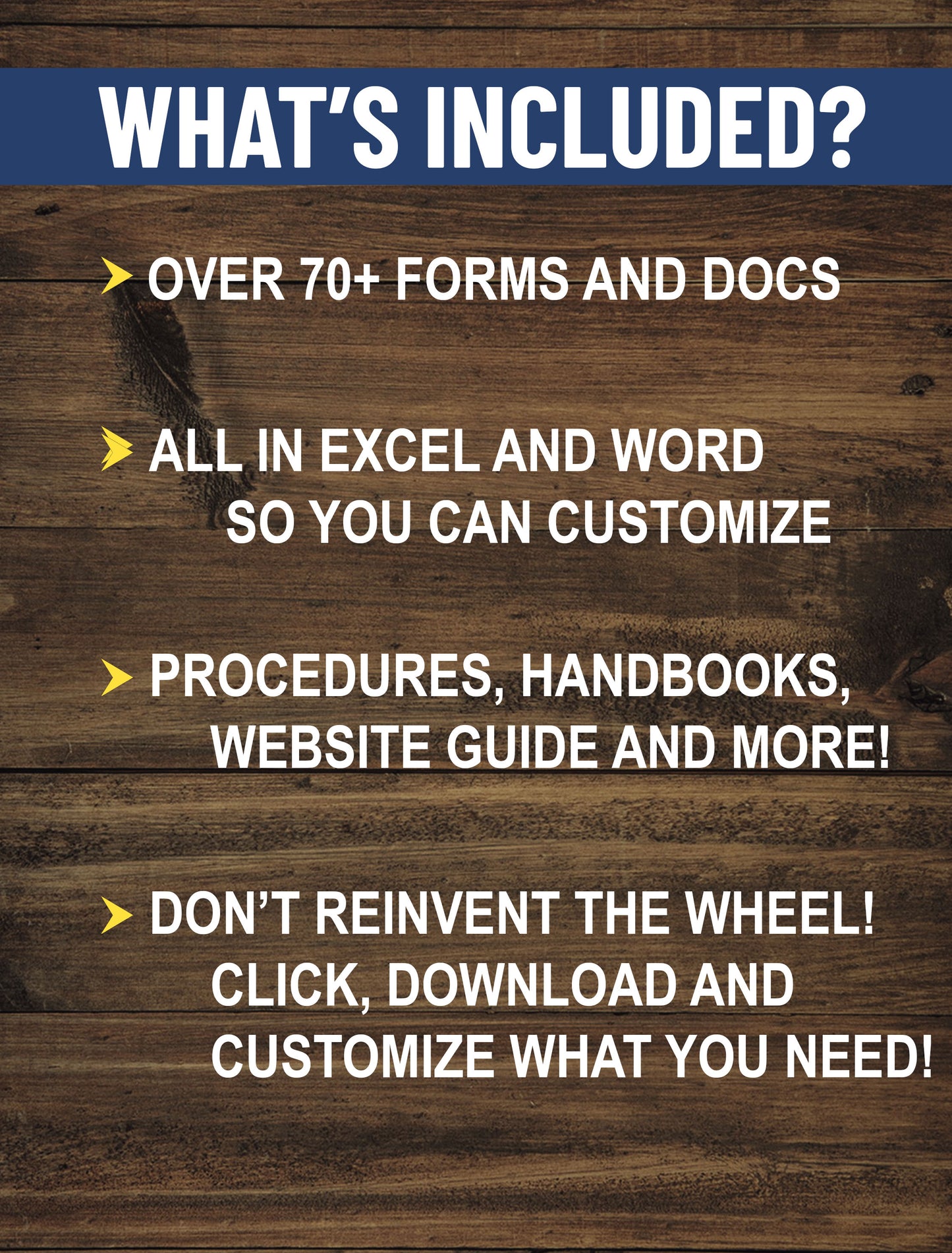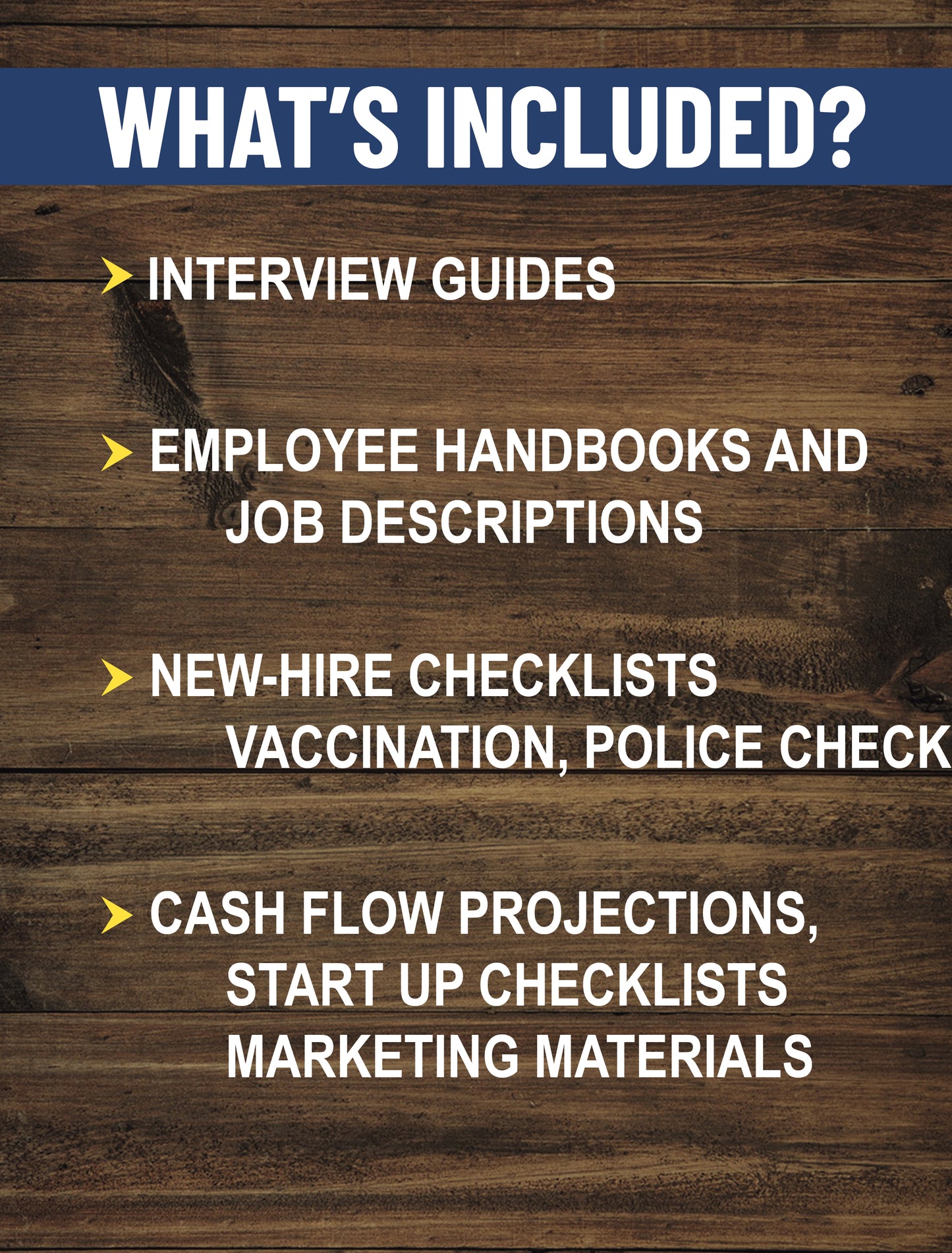The demand for home health care services in the United States has been steadily increasing as the population ages and more people prefer to receive care in the comfort of their homes. Starting a home health care agency can be a rewarding and profitable venture, but it also comes with its own set of challenges and regulatory requirements. In this comprehensive guide, we will outline the essential steps and considerations for launching your own home health care agency in the United States.
Home Care 101 is dedicated to providing resources to help new home care agencies succeed! Check out our Shop to purchase your own Home Care Start Up Kit, Home Care Policy & Procedure Manual, and Nursing Skills Policy & Procedure Manual. We have everything you need to get started!
Step 1: Research and Planning
Identify Your Niche
Home health care encompasses a wide range of services. To narrow down your focus, consider an example: You might decide to specialize in pediatric home health care, providing specialized care for children with medical needs, such as pediatric nursing, physical therapy, and speech therapy.
-
Specializing in pediatric care involves providing comprehensive medical and therapeutic services to children with acute or chronic illnesses. Services may include pediatric nursing, physical therapy, occupational therapy, and speech therapy.
-
Focusing on the elderly population, geriatric home care agencies offer services to help seniors maintain their independence at home. This can include assistance with activities of daily living (ADLs), medication management, and fall prevention.
-
Agencies specializing in Alzheimer's and dementia care provide specialized support for individuals with memory disorders. Caregivers are trained to handle the unique challenges associated with these conditions, including behavioral and communication issues.
-
This niche caters to individuals recovering from surgeries or hospital stays. Services often include post-operative wound care, physical therapy, and assistance with mobility.
-
Palliative care focuses on improving the quality of life for individuals with serious illnesses, while hospice care is designed for those in the final stages of life. These services prioritize comfort, pain management, and emotional support for patients and their families.
-
Mental health home care agencies provide support for individuals dealing with mental health issues, such as depression, anxiety, or schizophrenia. Services may include counseling, medication management, and assistance with daily routines.
-
Specializing in wound care and ostomy services involves treating and managing complex wounds, surgical stomas, and related medical conditions. This niche requires specialized training in wound care techniques.
-
Agencies specializing in maternal and newborn care offer support to expectant mothers, postpartum women, and newborns. Services may include prenatal education, breastfeeding support, and newborn care.
-
Focusing on patients with respiratory conditions such as COPD or asthma, respiratory care agencies provide services like oxygen therapy, nebulizer treatments, and education on managing respiratory conditions.
-
This niche involves providing and maintaining medical equipment in patients' homes. Examples include home oxygen therapy equipment, wheelchairs, and hospital beds.
Choosing the right niche for your home health care agency depends on factors like local demand, your team's expertise, and your passion for serving specific populations. By specializing in a niche, you can tailor your services to meet the unique needs of your target clients, differentiate your agency in the market, and build a strong reputation within that niche. There is a lot of overlap in the services and the qualifications of the staff required, so feel free to mix and match!
1.2 Market Research
Conduct thorough market research using tools like demographic data, competitor analysis, and surveys. For instance, if you find that there's a growing population of seniors in your area, you might decide to specialize in geriatric home care. The Home Care 101 Start Up Kit includes a detailed business plan that you can utilize and customize to your geographic region for your own home care agency.
Step-by-Step Guide to Market Research:
-
Define Your Research Objectives:
-
Determine the specific information you need to make informed decisions about your agency's niche. For example, understand the demographics, preferences, and needs of your target population.
-
Gather Demographic Data:
-
Resources:
-
U.S. Census Bureau (census.gov): Provides comprehensive demographic data for your area.
-
State and local health departments: Offer health-related statistics and population demographics.
-
Analyze Competitors:
-
Resources:
-
Competitor websites and marketing materials: Review their services, pricing, and unique selling propositions.
-
Online review platforms (e.g., Yelp, Google Reviews): Read customer feedback to understand strengths and weaknesses.
-
Chamber of Commerce or industry associations: May provide lists of local home health care agencies.
-
Conduct Surveys and Interviews:
-
Questionnaire for Competitor Interviews:
-
Name of Competitor:
-
Location(s) of Competitor:
-
Services Offered:
-
Target Clientele:
-
Pricing Structure:
-
Unique Selling Proposition:
-
Marketing Strategies:
-
Strengths and Weaknesses:
-
Customer Satisfaction Insights:
-
Any Upcoming Expansion Plans?
-
Additional Comments:
-
Analyze Survey Data:
-
If conducting surveys among potential clients or healthcare professionals, use tools like SurveyMonkey or Google Forms to collect and analyze responses.
-
Identify Trends and Opportunities:
-
Look for patterns in the data that may indicate growing demand for specific services or unmet needs in your community. For example, if there's a significant increase in the elderly population, there might be a growing demand for geriatric home care.
-
Validate Your Findings:
-
Consult with local healthcare professionals, social workers, and senior centers to validate your research findings and gain additional insights.
-
Make Informed Decisions:
-
Based on your research, determine if there is a viable niche for your agency. Consider factors like competition, potential profitability, and your agency's capabilities.
By conducting thorough market research, you can make informed decisions about the niche that best suits your home health care agency. This research will help you identify opportunities for growth, refine your service offerings, and tailor your marketing strategies to meet the needs of your target clientele.
Remember that market research is an ongoing process. Continuously monitor the market, gather feedback from clients and healthcare professionals, and adapt your agency's strategies to stay competitive and relevant in the ever-evolving healthcare landscape.
1.3 Legal Structure
Choosing the right legal structure is critical. For instance, if you opt for an LLC, you'll have personal liability protection, which can be crucial in a highly regulated industry like healthcare.
Sole Proprietorship
-
Description: A sole proprietorship is the simplest and most common legal structure for startups. It means that you and your business are one and the same from a legal perspective. You have full control over the business but are personally responsible for its debts and liabilities.
-
Example: Sarah is a registered nurse who starts a new home health care agency called "Caring Hands Home Care" on her own. She operates as a sole proprietorship.
Limited Liability Company (LLC)
-
Description: An LLC offers a balance between simplicity and personal liability protection. It separates your personal assets from those of your business, shielding your personal assets from business debts and lawsuits. It's a popular choice for startups because of its flexibility.
-
Example: John and Lisa co-found a new home health care agency, "Comfort Care LLC." They choose an LLC structure to protect their personal assets in case of any legal issues within the business.
Corporation (Inc.)
-
Description: A corporation is a separate legal entity from its owners. It provides the highest level of personal liability protection but comes with more complex formalities, such as holding regular meetings and maintaining detailed records.
-
Example: "Professional Care, Inc." is a large and well-established home health care agency with multiple branches. It operates as a corporation to protect its owners' personal assets and facilitate growth and expansion.
Partnership
-
Description: A partnership is formed when two or more individuals share ownership and responsibilities in a business. Like sole proprietorships, partnerships do not provide personal liability protection.
-
Example: Jane and Mark decide to start a new home health care agency called "Healing Hearts Partnership." They form a general partnership where they share ownership and management responsibilities equally.
Nonprofit Organization
-
Description: Nonprofits are mission-driven organizations that reinvest their profits back into their missions. They often serve the community, provide healthcare services, and may qualify for tax-exempt status.
-
Example: "Hopeful Horizons Home Health Care" is a nonprofit organization that focuses on providing free or low-cost home health care services to underserved populations in a specific region.
Cooperative
-
Description: A cooperative is owned and operated by its members, who share in the decision-making process and profits. Cooperatives are less common in the home health care industry but can be a unique structure.
-
Example: A group of home health care professionals forms a cooperative called "Caring Community Cooperative" to collectively provide services and share in the business's earnings.
Choosing the right legal structure for your new home health care agency should be based on factors like liability protection, taxation, ownership, and your long-term business goals. Consulting with a legal or financial professional experienced in healthcare startups is advisable to make an informed decision that aligns with your business vision and objectives.
1.4 Business Plan
In your business plan, detail your financial projections. For instance, if your research shows that there's a significant need for home health care services in your community and you plan to offer a range of services, your projected revenue might be $500,000 in the first year.
Creating a comprehensive business plan is essential for the success of your new home health care agency. Here's a breakdown of the key elements of a business plan and what each section should contain:
Executive Summary
-
Description: A brief overview of your home health care agency, including its mission, goals, and the problem you aim to address in the market.
-
Information to Include:
-
Business name and location.
-
A concise summary of your niche and target market.
-
Your agency's unique selling proposition (USP).
-
A summary of your financial projections, including startup costs and revenue expectations.
-
Description: Detailed information about your agency, its history, and the services you plan to offer.
-
Information to Include:
-
Legal structure (e.g., LLC, Corporation, Sole Proprietorship).
-
Location and facilities.
-
A brief company history.
-
An overview of your services and specialization.
-
Description: An in-depth analysis of your target market, competitors, and industry trends.
-
Information to Include:
-
Demographic data of your target clientele.
-
Competitor analysis, including strengths and weaknesses.
-
Market trends, such as population growth or healthcare legislation.
-
Description: Details about your agency's organizational structure and the qualifications of your team.
-
Information to Include:
-
Names and roles of key team members.
-
Resumes highlighting their relevant experience and qualifications.
-
Information about your board of directors or advisors.
-
Description: A comprehensive description of the home health care services you plan to provide and the specific niche you intend to serve.
-
Information to Include:
-
Detailed descriptions of each service.
-
Any specialized care or unique offerings.
-
How your services meet the needs of your target market.
-
Description: Your plan for attracting and retaining clients, including your marketing and sales efforts.
-
Information to Include:
-
Marketing channels and strategies.
-
Pricing structure and payment options.
-
Sales tactics and customer acquisition strategies.
-
Description: If you're seeking external funding, outline your financing needs and how you plan to use the funds.
-
Information to Include:
-
The amount of funding required.
-
How you will use the funds (e.g., equipment purchase, marketing).
-
Your funding sources (e.g., loans, investors).
-
Description: Detailed financial forecasts, including income statements, balance sheets, and cash flow statements.
-
Information to Include:
-
Startup costs.
-
Monthly and annual revenue projections.
-
Break-even analysis.
-
Profit and loss projections for at least the first three years.
-
Description: Supplementary information that supports your business plan, such as resumes, legal documents, or additional research data.
-
Information to Include:
-
Resumes of key team members.
-
Legal documents (e.g., licenses, permits).
-
Any additional research or market data.
Creating a well-structured business plan helps you clarify your agency's goals, strategies, and financial expectations. It also serves as a valuable tool when seeking funding, making strategic decisions, and communicating your business vision to potential partners or investors. Regularly update and revise your business plan to adapt to changing market conditions and keep your agency on track for success.
Step 2: Compliance with Regulations
2.1 Licensing
The licensing process for home health care agencies varies from state to state but generally follows a similar framework. Here, we'll provide an overview of the application process for licensing in five different states: Florida, California, Pennsylvania, Texas, and Ohio. We'll also outline a sample list of policies and procedures that are commonly reviewed during the licensing process. Writing policies is a big task! Purchase the Home Care Policy & Procedure Manual to skip the heavy lifting of writing all the policies, and focus your energy instead on just customizing these policies for your unique business.
FloridaApplication Process:
-
In Florida, home health care agencies must apply for a license through the Florida Agency for Health Care Administration (AHCA).
-
Key steps include completing the application, submitting required documents, and passing an inspection.
Required Information:
-
Proof of legal structure (e.g., LLC, Corporation).
-
Proof of liability insurance.
-
Criminal background checks for agency owners and key staff.
-
Detailed business plan.
-
Policies and procedures manual.
Sample List of Policies and Procedures:
-
Client admission and assessment.
-
Care plan development and review.
-
Infection control policies.
-
Medication management procedures.
-
Emergency preparedness plan.
-
Staff training and orientation.
-
Patient rights and responsibilities.
-
Quality assurance and improvement program.
-
Reporting and documentation protocols.
-
Privacy and confidentiality policies (HIPAA compliance).
Application Process:
-
In California, you would apply for a Home Health Agency (HHA) license through the California Department of Public Health (CDPH).
-
This involves completing an application, paying fees, and undergoing an initial survey.
Required Information:
-
Proof of legal structure and ownership.
-
Evidence of financial stability.
-
Personnel qualifications and background checks.
-
Compliance with state regulations and standards.
Sample List of Policies and Procedures:
-
Infection control and prevention protocols.
-
Supervision and evaluation of staff.
-
Client assessment and care planning.
-
Medication administration and management.
-
Incident reporting and investigation.
-
Emergency preparedness and disaster response.
-
Patient rights and grievance procedures.
-
HIPAA compliance and privacy safeguards.
-
Continuous quality improvement program.
-
Billing and reimbursement procedures.
Application Process:
-
In Pennsylvania, home health care agencies are licensed by the Department of Health.
-
The application process involves submitting various forms, documentation, and fees.
Required Information:
-
Agency ownership and management structure.
-
Proof of compliance with state laws and regulations.
-
Financial records and stability.
-
Staff qualifications and background checks.
Sample List of Policies and Procedures:
-
Admission, assessment, and care planning.
-
Supervision and training of personnel.
-
Infection control and prevention measures.
-
Medication administration and management.
-
Patient rights and responsibilities.
-
Incident reporting and follow-up.
-
Emergency preparedness and disaster response.
-
Quality assessment and improvement initiatives.
-
Confidentiality and patient privacy policies.
-
Billing, coding, and reimbursement procedures.
Application Process:
-
In Texas, home health care agencies must apply for a license through the Texas Department of Aging and Disability Services (DADS).
-
The process involves submitting an application, undergoing a background check, and participating in an initial survey.
Required Information:
-
Proof of legal structure and ownership.
-
Financial statements and stability.
-
Personnel qualifications and background checks.
-
Compliance with state regulations and standards.
Sample List of Policies and Procedures:
-
Patient assessment and care planning.
-
Staff orientation and training.
-
Infection control and prevention policies.
-
Medication management and administration.
-
Reporting of abuse, neglect, and exploitation.
-
Emergency preparedness and response plans.
-
Patient rights and grievance procedures.
-
Continuous quality improvement program.
-
HIPAA compliance and patient confidentiality.
-
Billing, coding, and reimbursement practices.
Application Process:
-
In Ohio, home health care agencies must apply for a license through the Ohio Department of Health (ODH).
-
The application process includes providing documentation, undergoing an initial survey, and paying fees.
Required Information:
-
Legal structure and ownership details.
-
Financial stability and insurance.
-
Personnel qualifications, including background checks.
-
Compliance with state regulations and laws.
Sample List of Policies and Procedures:
-
Client assessment, care planning, and coordination.
-
Staff training and competency evaluations.
-
Infection control and prevention measures.
-
Medication management and administration.
-
Incident reporting and investigation.
-
Emergency preparedness and response protocols.
-
Patient rights, advocacy, and complaints.
-
Continuous quality improvement and performance monitoring.
-
Privacy and confidentiality policies (HIPAA).
-
Billing, claims submission, and reimbursement procedures.
Please note that specific requirements may change over time, and it's essential to consult the relevant state agencies and regulations for the most up-to-date information on licensing processes and requirements in your area. The provided sample policies and procedures are meant as general examples and should be customized to align with your agency's specific practices and state regulations.
2.2 Medicare/Medicaid Certification
For certification, you would need to meet CMS standards. Meeting these standards can include demonstrating compliance with regulations related to patient care, staffing, and quality improvement.
Meeting the standards set by the Centers for Medicare & Medicaid Services (CMS) is a crucial aspect of obtaining certification for your home health care agency. CMS certification allows your agency to provide services to Medicare and Medicaid beneficiaries, significantly expanding your client base. Here's a more detailed explanation of the CMS standards and the areas they cover:
Patient Care StandardsCMS standards related to patient care are designed to ensure that home health care agencies provide high-quality, patient-centered care. These standards include:
- Patient Assessment and Care Planning: Home health agencies must conduct comprehensive assessments of each patient's needs and develop individualized care plans. This includes determining the scope of care required, the frequency of visits, and the goals of treatment.
- Skilled Services: CMS requires that care be provided by qualified healthcare professionals such as registered nurses, licensed practical nurses, physical therapists, occupational therapists, and speech-language pathologists. The agency must ensure that the appropriate skilled services are provided based on the patient's condition.
-
Care Coordination: Agencies must coordinate care among different healthcare providers, ensure the proper implementation of care plans, and maintain open communication with the patient's primary care physician.
-
Medication Management: Home health agencies are responsible for the proper management and administration of medications, including verifying medication lists, educating patients on proper usage, and ensuring compliance with medication-related regulations.
-
Infection Control: CMS mandates strict infection control measures to protect both patients and staff. This includes proper hand hygiene, the use of personal protective equipment, and adherence to infection control protocols.
Staffing Standards
CMS sets staffing standards to ensure that home health care agencies have a qualified and competent team to provide safe and effective care to patients. These standards encompass:
-
Staff Qualifications: Home health agencies must ensure that their staff members, including nurses and therapists, meet state licensing and certification requirements. Background checks and verification of credentials are typically required.
-
Staff Training: CMS emphasizes the importance of ongoing staff training and competency evaluations to keep healthcare professionals up-to-date with current practices and regulations.
-
Supervision: There should be appropriate supervision and oversight of all staff, especially those providing direct patient care. Supervisors are responsible for ensuring that care is delivered according to the care plan and in compliance with regulations.
Quality Improvement Standards
To maintain CMS certification, home health care agencies are expected to continually assess and improve the quality of care they provide. Quality improvement standards include:
-
Performance Improvement Plans (PIPs): Agencies are required to implement PIPs to address specific areas where the quality of care may need improvement. PIPs involve data collection, analysis, and the development of action plans to enhance care quality.
-
Outcome Measurement: CMS emphasizes the measurement of patient outcomes and satisfaction as a way to evaluate the effectiveness of care. Agencies should use standardized assessment tools to track patient progress.
-
Patient Satisfaction: Agencies must regularly assess patient satisfaction and feedback, making necessary adjustments to improve the patient experience and quality of care.
Meeting CMS standards involves rigorous compliance with regulations, comprehensive documentation of care, and a commitment to continuous improvement. It's essential for agencies seeking CMS certification to stay updated on the latest CMS guidance and regulations, as they may evolve over time. CMS also conducts surveys and audits to assess compliance, so maintaining adherence to these standards is an ongoing process that ensures the highest level of care for Medicare and Medicaid beneficiaries.
2.3 Accreditation
If you choose to pursue accreditation, an organization like The Joint Commission would conduct a rigorous assessment of your agency's policies, procedures, and practices.
Pursuing accreditation for your home health care agency is a significant step toward demonstrating your commitment to quality care and patient safety. Accreditation organizations like The Joint Commission provide a thorough assessment process to evaluate your agency's policies, procedures, and practices. Here's an overview of accreditation bodies and the typical process for accreditation:
Accreditation Bodies:
-
The Joint Commission (TJC):
-
The Joint Commission is one of the most widely recognized accrediting bodies in healthcare. It sets rigorous standards for healthcare organizations, including home health care agencies, to ensure the highest quality of care.
-
Other Services: TJC offers specialized accreditation programs, such as the Home Care Accreditation Program, specifically designed for home health care agencies.
-
Accreditation Commission for Health Care (ACHC):
-
ACHC is a nonprofit accreditation organization that focuses on home health care, hospice, and various other healthcare services. It offers a streamlined accreditation process tailored to home health agencies.
-
Other Services: ACHC provides educational resources and support to help agencies maintain compliance with industry standards.
-
Community Health Accreditation Partner (CHAP):
-
CHAP is an accrediting body dedicated to community-based healthcare organizations, including home health agencies. It emphasizes a collaborative approach to improving patient care.
-
Other Services: CHAP offers accreditation in various healthcare areas and provides educational resources to assist agencies in meeting standards.
Typical Accreditation Process:
The process for achieving accreditation from organizations like The Joint Commission, ACHC, or CHAP generally includes the following steps:
-
Preparation and Application:
-
Review the accreditation standards and requirements provided by the chosen accrediting body.
-
Develop or update your agency's policies, procedures, and practices to align with these standards.
-
Complete the accreditation application and submit it along with the required documentation.
-
Initial Assessment:
-
The accrediting body assigns a surveyor or survey team to conduct an initial assessment of your agency.
-
The surveyor(s) will review your policies, observe your operations, and interview staff members to ensure compliance with accreditation standards.
-
On-Site Survey:
-
An on-site survey is typically conducted to assess your agency's practices in action.
-
The surveyor(s) will interact with staff, review patient records, and observe patient care to evaluate compliance with standards.
-
Report and Follow-Up:
-
The surveyor(s) provide a detailed report of their findings, including areas of compliance and any deficiencies.
-
Your agency will have an opportunity to address and correct deficiencies identified during the survey.
-
Accreditation Decision:
-
The accrediting body's review committee evaluates the survey findings and determines whether your agency meets the standards for accreditation.
-
If your agency successfully meets the standards, accreditation is granted.
-
Ongoing Compliance and Reaccreditation:
-
Accreditation is typically valid for a specific period (e.g., three years).
-
Agencies are required to maintain ongoing compliance with standards and may undergo periodic surveys for reaccreditation.
Achieving accreditation signifies to clients, referral sources, and payers that your home health care agency is dedicated to providing high-quality care and adhering to industry best practices. It can enhance your agency's reputation, improve patient safety, and contribute to better patient outcomes.
2.4 Staffing Requirements
For example, in New York, home health aides must complete a state-approved training program and pass a competency evaluation. Complying with these requirements is essential to operate legally.
These requirements are crucial to ensure that the agency's personnel are well-qualified, properly oriented, and continuously updated with the skills and knowledge necessary to provide high-quality care to patients.
Staffing Requirements for Home Health Care Agencies
-
Verification of Credentials:
-
Home health care agencies must rigorously verify the credentials of all staff members, including nurses, therapists, and aides. This verification process typically includes checking licenses, certifications, and professional references.
-
For example, in Texas, nurses and therapists must hold current and valid licenses issued by the Texas Board of Nursing or the Texas Board of Physical Therapy Examiners, and these licenses must be verified before employment.
-
Orientation and Training:
-
New hires at home health care agencies should undergo comprehensive orientation and training programs. These programs ensure that staff members are familiar with the agency's policies and procedures, as well as the specific needs of the patient population they will be serving.
-
Orientation may cover topics such as agency protocols, infection control, patient rights, and emergency procedures.
-
Continuing Education:
-
Continuing education is a vital component of maintaining staff competency. Home health care agencies often require their employees to participate in ongoing training and education programs.
-
For example, nurses and therapists may need to complete a specified number of continuing education units (CEUs) each year to stay updated on the latest healthcare practices and regulatory changes.
-
Staffing Ratios:
-
Staffing ratios are an essential consideration for home health care agencies to ensure patient safety and quality of care. These ratios determine how many patients can be assigned to each caregiver.
-
Staffing ratios can vary depending on state regulations and the needs of the patient population. For instance, the ratio for skilled nursing visits may differ from that for personal care aides.
-
Compliance with State Regulations:
-
Home health care agencies must adhere to state-specific staffing regulations and guidelines. These regulations may include requirements for staffing levels, qualifications, and supervision.
-
Compliance with state regulations helps agencies maintain their licensure and certification status.
-
Background Checks and Health Screenings:
-
Agencies often conduct comprehensive background checks and health screenings on prospective employees to ensure they are fit for the demands of home healthcare.
-
Background checks may include criminal history checks, while health screenings may assess physical health and communicable disease status.
-
Skill Competency Evaluation:
-
To verify that staff members possess the necessary skills to provide safe and effective care, agencies may conduct skill competency evaluations.
-
These evaluations assess a caregiver's ability to perform specific tasks related to patient care, such as wound care or medication administration.
Adhering to these staffing requirements is essential for home health care agencies to maintain high standards of care and ensure the well-being of their patients. Compliance with credential verification, ongoing training, and staffing ratios helps agencies deliver safe, effective, and patient-centered care, ultimately contributing to positive patient outcomes and satisfaction.
2.5 Privacy and HIPAA
Implement robust HIPAA compliance policies and procedures to safeguard patient information. Training your staff on HIPAA regulations is vital to prevent data breaches.
Safeguarding patient information through robust HIPAA (Health Insurance Portability and Accountability Act) compliance policies and procedures is of paramount importance in the healthcare industry. Here's an expanded section on implementing and maintaining HIPAA compliance:
Implementing Robust HIPAA Compliance Policies and Procedures
-
Understand HIPAA Requirements: Begin by thoroughly understanding the requirements of the HIPAA Privacy and Security Rules. Familiarize yourself with the specific obligations and standards outlined in these rules.
-
Develop HIPAA Policies and Procedures: Create comprehensive policies and procedures that address the safeguarding of patient information, including electronic health records (EHRs), paper records, and verbal communications. Ensure these policies align with HIPAA requirements.
-
Privacy Officer Appointment: Appoint a Privacy Officer responsible for overseeing and enforcing HIPAA compliance within your home health care agency. This individual should have a deep understanding of HIPAA regulations.
-
Staff Training: Conduct regular training sessions for all staff members to educate them about HIPAA regulations and your agency's policies. Training should cover topics like protected health information (PHI), permissible uses and disclosures, and breach reporting.
-
Access Control: Implement strict access controls for electronic health records and other patient data. Ensure that staff members only have access to the information necessary for their roles.
-
Risk Assessment: Conduct regular risk assessments to identify vulnerabilities and potential threats to patient information. This assessment helps in developing strategies to mitigate risks effectively.
-
Encryption and Secure Communication: Encrypt electronic communications and data to protect patient information during transmission. Use secure methods for sharing PHI, such as encrypted email and virtual private networks (VPNs).
-
Business Associate Agreements: Ensure that all business associates, such as third-party billing companies or IT service providers, sign HIPAA-compliant business associate agreements. These agreements outline their responsibilities for safeguarding PHI.
-
Incident Response Plan: Develop a comprehensive incident response plan that outlines steps to take in the event of a data breach or security incident. Prompt reporting and investigation of breaches are critical.
-
Physical Security: Safeguard physical copies of patient records by implementing security measures, such as locked filing cabinets and restricted access areas.
-
Ongoing Audits and Monitoring: Regularly audit and monitor your agency's HIPAA compliance efforts. This includes reviewing access logs, conducting internal audits, and ensuring staff adherence to policies.
-
Reporting and Documentation: Document all security incidents, risk assessments, and actions taken to address security concerns. Timely and accurate reporting is essential in case of audits or breaches.
-
Patient Rights: Educate patients about their rights under HIPAA, including the right to access their medical records and the right to request privacy protections.
-
Updates and Changes: Stay updated on changes to HIPAA regulations and modify your policies and procedures accordingly. Compliance is an ongoing process.
-
Response to Breaches: If a breach occurs, follow the required breach notification process, which includes notifying affected individuals, the U.S. Department of Health and Human Services (HHS), and, in some cases, the media.
Implementing and maintaining robust HIPAA compliance policies and procedures is not only a legal requirement but also an ethical obligation to protect the confidentiality and privacy of patients' sensitive information. By prioritizing HIPAA compliance, your home health care agency can build trust with patients, avoid costly fines and penalties, and uphold the highest standards of data security and patient care.
Step 3: Finances and Funding
3.1 Budgeting
Your budget should include itemized startup costs, such as office space, supplies, and staff salaries. As an example, consider that renting office space in a metropolitan area might cost $3,000 to $5,000 per month.
Here's a list of typical startup expenses to consider and plan for:
Office Space:
- Renting office space in a suitable location is often one of the most significant startup expenses. Costs can vary significantly based on location and size. As mentioned, in metropolitan areas, it might range from $3,000 to $5,000 per month.
Licensing and Permits:
- Budget for fees associated with obtaining necessary licenses and permits, including state home health care agency licenses, local business permits, and healthcare provider certifications.
Staff Salaries and Benefits:
- Allocate funds for staff salaries, including nurses, therapists, aides, and administrative personnel. Consider benefits such as health insurance, retirement plans, and paid time off.
Equipment and Supplies:
- Purchase or lease medical equipment, office furniture, and supplies. This can include items like medical beds, mobility aids, computers, software, office furniture, and medical supplies.
Insurance:
- Budget for various insurance types, including liability insurance, workers' compensation insurance, and malpractice insurance. Insurance costs can vary based on the coverage levels and location.
Marketing and Advertising:
- Set aside funds for marketing and advertising efforts, including website development, printed materials (brochures, business cards), online advertising, and community outreach events.
Staff Training:
- Invest in training programs for your staff to ensure they are well-prepared and compliant with regulations. Training expenses can include curriculum development and trainer fees. If you are running a Home Health Care Agency and providing nursing services, ensure you have a complete Nursing Skills Policy & Procedure Manual.
Transportation:
- If your agency will provide transportation for staff and patients, budget for vehicle purchases, fuel, maintenance, and insurance.
Technology and Software:
- Acquire software and technology tools for electronic health records (EHRs), billing and invoicing, scheduling, and telehealth services.
Legal and Professional Fees:
- Consider expenses related to legal counsel, accounting services, and consulting to ensure compliance with healthcare regulations and establish sound financial practices.
Furniture and Office Setup:
- Invest in office furniture, equipment, and setup costs for a comfortable and functional workspace.
12. Office Utilities and Maintenance:
- Budget for ongoing expenses such as utilities (electricity, water, internet), maintenance, and janitorial services for your office.
13. Vehicle Expenses:
- If your agency provides home visits, account for vehicle expenses, including insurance, maintenance, and fuel for agency-owned vehicles.
14. Initial Marketing Campaigns:
- Allocate funds for initial marketing campaigns to raise awareness about your agency's services. This may include online advertising, printed materials, and promotional events.
15. Compliance and Accreditation Fees:
- Factor in fees associated with achieving and maintaining compliance with state regulations and accreditation bodies like The Joint Commission or ACHC.
16. Contingency Fund:
- Reserve a portion of your budget for unexpected expenses or cash flow gaps during the startup phase.
17. Employee Background Checks and Screenings:
- Include the costs of conducting background checks and health screenings for your staff, which may be required by state regulations.
Remember that the actual costs may vary based on factors such as location, agency size, and specialization. It's essential to conduct thorough research, create a detailed budget, and consider consulting with a financial advisor to ensure that you have a realistic and sustainable financial plan for your home health care agency's startup phase.
3.2 Funding Sources
If you lack personal savings, explore financing options. You might secure a Small Business Administration (SBA) loan or attract investors interested in healthcare startups.
3.3 Billing and Reimbursement
Familiarize yourself with the billing requirements of different payers. For instance, when billing Medicare, ensure your staff uses the appropriate codes and documentation to maximize reimbursement.
Step 4: Staffing and Training
4.1 Recruitment
When hiring nurses or therapists, seek candidates with relevant certifications. For example, if you're looking for physical therapists, ensure they have state licensure and relevant experience.
4.2 Training
Consider offering continuous training. For instance, if you have a registered nurse on staff, provide regular training to keep them updated on the latest medical practices and technologies. Provide your nurses with a detailed Nursing Skills Policy & Procedure Manual.
4.3 Caregiver Screening
Conduct thorough background checks on caregivers. For example, you might use a third-party background check service to ensure that your caregivers have clean criminal records.
Step 5: Marketing and Networking
5.1 Online Presence
Create a website featuring testimonials from satisfied clients and showcase your agency's specialization. Use social media to share informative articles about home health care and engage with potential clients.
Creating an effective online presence and utilizing digital marketing strategies can significantly benefit your home health care agency.
Building a Strong Online Presence:
Develop a Professional Website:
-
Your agency's website serves as a virtual storefront and a crucial point of contact for potential clients. Ensure it is professionally designed, easy to navigate, and mobile-responsive.
-
Include essential information such as your agency's mission, services, staff credentials, contact details, and a clear call-to-action for inquiries.
-
Feature genuine testimonials and success stories from satisfied clients and their families. These personal accounts can build trust and credibility.
-
Include before-and-after scenarios or narratives of how your agency positively impacted the lives of patients and improved their quality of life.
-
Emphasize your agency's specialization prominently on your website. Explain how your unique expertise benefits patients in need of specialized care.
-
Create dedicated pages or sections that provide in-depth information about your specialized services, such as pediatric care or geriatric care.
-
Regularly publish informative articles and blog posts on your website that address common questions and concerns related to home health care.
-
Topics may include caregiving tips, disease management, medication safety, and the benefits of home health care. Use these articles to position your agency as an authority in the field.
Search Engine Optimization (SEO):
-
Optimize your website for search engines to improve its visibility. Research relevant keywords and incorporate them into your content, meta tags, and headers.
-
Include location-specific keywords to attract local clients looking for home health care services in your area.
-
Create and maintain active social media profiles on platforms like Facebook, Twitter, and LinkedIn. Use these platforms to share valuable content and engage with potential clients.
-
Respond promptly to inquiries and comments, fostering a sense of community and trust.
-
Consider creating video content, such as patient stories, staff introductions, or educational videos. Visual content can be engaging and help convey your agency's personality.
-
Build an email list of interested individuals and send out newsletters with updates, educational content, and success stories. Email marketing can help nurture leads over time.
-
Use online advertising platforms like Google Ads or Facebook Ads to target specific demographics and reach potential clients actively searching for home health care services.
Monitoring and Analytics:
- Use website analytics and social media insights to track the effectiveness of your online efforts. Adjust your strategies based on data to improve engagement and conversions.
Compliance and Privacy:
- Ensure that your online activities, including collecting testimonials and sharing patient stories, comply with HIPAA regulations and patient privacy guidelines.
Building a strong online presence not only attracts potential clients but also allows you to establish your agency's credibility and expertise in the home health care field. By consistently providing valuable information and engaging with your audience, you can build trust, foster positive relationships, and ultimately grow your client base.
5.2 Networking
Form partnerships with local hospitals. For instance, if you specialize in post-hospitalization care, establish relationships with hospital discharge planners to receive patient referrals.
5.3 Marketing Materials
Design professional brochures and business cards. Include success stories and statistics, such as the number of patients you've served or your agency's patient satisfaction ratings.
Conclusion
Starting a home health care agency in the United States is a complex but rewarding endeavor. It requires careful planning, regulatory compliance, financial stability, and a commitment to providing high-quality care. By following the steps outlined in this guide and staying informed about industry developments, you can embark on a successful journey into the home health care business, making a positive impact on the lives of those in need while building a thriving enterprise. Remember, success in this industry requires dedication and a genuine commitment to improving the well-being of your clients.
About the Author










2 comments
Hi, I live in Canada and would like to talk with you on starting a care home business.
Thank you
I would like to open a 24 hour home care
I live in Hillsboro Oregon
What can I had to do?
5035017472